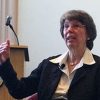Sally Wall, a professor emerita at Notre Dame of Maryland University, said at a recent talk at the School of Education that she didn’t realize how much psychic energy it took to hide her sexuality at work until she went on a yearlong sabbatical at the University of Pittsburgh.
There she lived openly as a lesbian. “It was liberating!”
At the talk titled “Out in the Groves of Academe: Lessons of a Lesbian Life in Academia,” Wall said, “Being any kind of ‘other’ is stressful. For gays and lesbians, we have to decide whether or not to come out in each new situation.”
Wall, a developmental psychologist who holds a PhD from Johns Hopkins University, said everyday life comprised a series of choices and sacrifices over how much to reveal about herself. When first hired for an academic position in the early 1980s, she feared the loss of her job, committee assignments and friendships if she disclosed her sexuality.
“Vigilance takes a toll, makes you paranoid. It also undermines your sense of safety and security,” she said. “I never invited female students to my home because I was aware of my vulnerability to accusations.”
Only after establishing her credibility as a faculty member and obtaining tenure did she “come out.” The response, she said, was “disconcerting.”
Wall, who taught courses on sex and gender, posted developmental research articles on her office door. One morning, “Kill all gays” was scrawled across an article asserting that children of homosexual parents were as well-adjusted as those of heterosexual couples. She wrote a letter to the student paper seeking dialogue with the anonymous perpetrators, to no avail, and the school administration didn’t offer support.
Faculty, who privately expressed dismay over the denial of health insurance for her partner, didn’t advocate for her. She even was warned by a colleague not to pursue it with the administration because it might jeopardize her effectiveness as chair of the psychology department.
“People I thought were allies did not publicly support me,” she said.
Wall told the School of Education audience that while anti-discrimination policies are important, acceptance and affirmation in daily social and professional interactions determine whether or not a campus is truly welcoming. “Being accepting and treating people fairly are what you can do,” she said.
The talk, held on December 1 in the Great Hall, was sponsored by the SOE Mentoring Program, Committee on Diversity and Civility and Faculty Development Committee.

